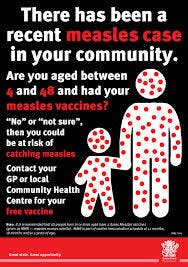By Paul Starkman
Recently, vaccinations and public health have dominated the national conversation.
Much of the focus is on the more than 141 confirmed cases of measles in the United States. Measles has been confirmed in 19 states and Washington D.C., including 107 cases in California.
According to the Centers for Disease Control and Prevention, measles is a highly contagious respiratory disease caused by a virus. It spreads through the air through coughing and sneezing. Measles can be serious, even deadly, especially for children younger than 5-years-old and those with weakened immune systems such as people battling cancer.
Vaccinations, specifically the MMR (measles, mumps, and rubella) are extremely effective at preventing disease. The CDC says the MMR vaccine is roughly 93 percent effective, while two doses are 97 percent effective in preventing measles. The CDC notes that widespread use of the measles vaccines has led to a 99 percent reduction in measles cases, and in the year 2000, measles were declared eliminated in the United States.
Can employers mandate vaccinations?
Outbreaks of such diseases can lead to significant absenteeism from employees who are taking care of their sick children or become ill themselves. Can employers mandate their employees to have certain vaccinations to contain the spread of a highly contagious disease?
Employers typically should not mandate that employees get vaccinations without a compelling business reason for doing so, such as if the employer operates a health care facility, serves an at-risk population (for example, a nursing home or a day care center) or the employer operates in a location where there has been a cluster of reported cases.
Employers subject to collective bargaining agreements must bargain with unions before implementing a mandatory vaccination policy. Even when an employer is not legally prohibited from mandating vaccinations, the employer will have to be prepared to make exceptions and accommodate employees with legitimate religious objections or medical reasons for becoming vaccinated.
Maintaining employee privacy
While tempting for employers to reach into files to learn who may be at risk for measles or other diseases in order to alleviate concerns or absenteeism, it is imperative that employers who obtain employee health care information through a variety of sources take steps to maintain the privacy of such information.
Employee health care information that is obtained in the course of making employment decisions, such as determining whether the employee is entitled to medical leave or needs an accommodation of a protected disability, must be kept in separate files from other employment records.
Employers that operate on-site clinics or are involved in making decisions regarding employee claims for benefits under employer-sponsored health care plans must adopt more stringent measures to maintain the privacy employee health care information. Steps typically include encrypting the data, keeping the information in password-protected files, establishing a written health information privacy plan and protocols to prevent the inadvertent disclosure or viewing of such information by those who do not have a “need-to-know.”
The consequences for not maintaining the privacy of employee health care information can include lawsuits, governmental audits, substantial fines and penalties.
There are also obligations to provide notice of data breaches to the employees whose health information was compromised, the government, and the media. Criminal sanctions are also possible. Employers must understand their obligations to maintain the privacy of employee health care information and must take substantial (and documented) steps to comply with their obligations.
Preventing absences
To help prevent additional work absences and loss of productivity, employers should look for positive ways to educate and motivate their employees to maintain a healthy lifestyle. Education and incentives should expand beyond commonly promoted smoking cessation and weight loss programs to now include adhering to the recommended vaccinations from the Centers for Disease Control and Prevention.
Employers could encourage employees to get vaccinations by paying for them, offer vaccinations at work, provide time off to get vaccinated and other wellness programs. Employers who take some of these steps will cultivate a healthier workforce and environment.
